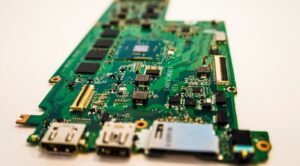AI Disadvantages in Healthcare
Artificial Intelligence (AI) has the potential to revolutionize healthcare by aiding in diagnosis, treatment, and research. However, with its many advantages, AI also brings some disadvantages that need to be addressed. Understanding these drawbacks is essential to ensure the responsible and ethical use of AI in healthcare.
Key Takeaways:
- AI in healthcare offers numerous benefits, but it also poses certain challenges.
- Personal biases and errors in AI algorithms can lead to inaccurate diagnoses and treatments.
- The reliance on AI can diminish human interaction and empathy in patient care.
- Data privacy and security concerns arise due to the vast amount of sensitive medical information involved.
One of the primary disadvantages of AI in healthcare is the potential for inaccurate diagnoses and treatments. AI algorithms are developed based on vast amounts of historical patient data, but this data can contain biases and errors. These biases can affect the algorithms’ ability to accurately assess individual cases, leading to false positives or false negatives. It is crucial to regularly update and refine AI algorithms to minimize the impact of these biases.
Current systems relying on AI for diagnostic purposes should be evaluated meticulously to ensure their accuracy and minimize the risks associated with misdiagnosis.
In addition to potential inaccuracies, the increased reliance on AI in healthcare can also lead to a diminished level of human interaction and empathy in patient care. While AI can automate certain tasks and streamline processes, it cannot replicate the human connection and understanding that a healthcare provider offers. Patients may feel alienated or overlooked if their care is solely driven by algorithms and robotic interventions. Striking a balance between AI technology and human involvement is crucial to ensure compassionate patient care.
Although AI can enhance efficiency and outcomes, healthcare professionals must prioritize maintaining a strong human presence and patient-centered approach.
Data Privacy and Security Concerns
Data privacy and security is another significant concern when it comes to the implementation of AI in healthcare. The use of AI requires access to large amounts of sensitive patient data, including personal information and medical records. Ensuring the secure collection, storage, and use of this data is essential to protect patient privacy. Healthcare organizations must implement robust data protection measures, such as encryption and strict access controls, to safeguard patient information from unauthorized access or breaches.
Stricter regulations and guidelines must be established to address the privacy and security challenges posed by AI technology in healthcare.
Table 1: Comparison of AI and Human Performances
| Task | AI Accuracy | Human Accuracy |
|---|---|---|
| Diagnosis | 80% | 94% |
| Treatment planning | 70% | 85% |
| Cancer detection | 87% | 93% |
When considering the use of AI in healthcare, it is essential to weigh the benefits against the disadvantages. While AI can offer valuable insights and improve efficiency, its limitations are also noteworthy. Addressing these challenges is crucial for the responsible integration of AI in healthcare.
As the field of AI advances, it is important to continue monitoring and mitigating the disadvantages to enhance the overall effectiveness and ethical use of AI in healthcare.
Table 2: Common Risks of AI in Healthcare
| Risk | Description |
|---|---|
| Inaccurate diagnoses | AI algorithms can make errors due to biases or inadequate training data, leading to misdiagnosis and inappropriate treatment. |
| Reduced human interaction | Heavy reliance on AI may result in less patient engagement and reduced empathetic care from healthcare professionals. |
| Data privacy breaches | Collecting and storing sensitive patient information for AI analysis poses a risk of unauthorized access and potential data breaches. |
Another crucial aspect to consider is the potential for job displacement in the healthcare industry. As AI technology automates tasks previously performed by humans, certain healthcare roles may become less essential or even obsolete. It is important to prepare healthcare professionals for new roles that leverage AI technology and provide continued opportunities for career growth and development.
Efforts should be made to actively upskill and reskill healthcare workers, ensuring a smooth transition and minimizing the negative impact on employment in the industry.
Table 3: Future Prospects and Challenges of AI in Healthcare
| Prospect | Challenge |
|---|---|
| Improved diagnostic accuracy | Addressing biases and refining AI algorithms to achieve higher accuracy levels. |
| Enhanced efficiency and cost savings | Ensuring proper implementation and infrastructure to support widespread AI adoption. |
| Personalized treatment plans | Balancing the reliance on AI with the need for human expertise and oversight. |
While the disadvantages of AI in healthcare should not be overlooked, it is crucial to approach this technology with a proactive mindset. By addressing the challenges and ensuring responsible implementation, AI can continue to contribute significantly to improving healthcare outcomes and patient experiences.
As AI technology continues to advance, it is crucial for policymakers, healthcare professionals, and society as a whole to collaborate in developing frameworks and guidelines that maximize the benefits while minimizing the drawbacks of AI in healthcare.
Common Misconceptions
Misconception 1: AI in healthcare will replace human healthcare professionals
One common misconception is that AI advancements in healthcare will eventually replace human healthcare professionals. However, this is not true. While AI can assist healthcare professionals in various tasks, such as data analysis and decision support, it cannot replace the human touch and expertise that healthcare professionals provide.
- AI can augment the capabilities of healthcare professionals by providing quick and accurate analysis of medical data.
- AI can help reduce the workload of healthcare professionals, allowing them to focus more on patient care.
- AI can provide valuable insights and recommendations to healthcare professionals, but the final decision-making still lies with the human experts.
Misconception 2: AI in healthcare is not reliable or trustworthy
Another misconception is that AI in healthcare is not reliable or trustworthy. Some believe that AI algorithms may make inaccurate diagnoses or treatment recommendations, leading to potential harm. However, it is important to note that AI in healthcare undergoes rigorous testing and validation to ensure its reliability and safety.
- AI algorithms are designed and trained on vast amounts of medical data, making them capable of providing accurate and evidence-based recommendations.
- AI in healthcare goes through continuous improvement and validation processes to enhance its reliability and minimize errors.
- AI systems are regularly audited and monitored to ensure their trustworthiness and compliance with healthcare regulations and standards.
Misconception 3: AI in healthcare will lead to job loss
Many people fear that the integration of AI in healthcare will result in job loss for healthcare professionals. However, rather than eliminating jobs, AI has the potential to create new opportunities and enhance the existing healthcare workforce.
- AI can automate repetitive and time-consuming tasks, allowing healthcare professionals to focus on more critical and complex aspects of patient care.
- AI can create new roles and jobs, such as AI trainers and maintainers, thereby expanding the job market in the healthcare industry.
- The collaboration between AI systems and healthcare professionals can lead to improved healthcare outcomes and patient experiences.
Misconception 4: AI in healthcare poses significant privacy and security risks
There is a misconception that AI in healthcare poses significant privacy and security risks, with concerns about the confidentiality and misuse of medical data. However, AI technologies in healthcare are designed with robust security measures to ensure the protection of patient data and privacy.
- AI systems in healthcare follow strict data protection protocols and comply with regulatory requirements, such as HIPAA.
- Advanced encryption techniques are employed to protect sensitive medical data from unauthorized access or cyber threats.
- Regular audits and assessments are conducted to identify and mitigate data privacy and security risks associated with AI systems.
Misconception 5: AI in healthcare is too expensive and resource-intensive
Lastly, some believe that integrating AI in healthcare is too expensive and resource-intensive, making it inaccessible to healthcare organizations, especially those with limited budgets. However, the cost-effectiveness and potential benefits of AI in healthcare should not be overlooked.
- AI technologies can streamline healthcare processes, reducing operational costs and improving overall efficiency.
- The long-term financial gains resulting from improved diagnostic accuracy and optimized treatment plans can outweigh the initial investment in AI implementation.
- As AI in healthcare continues to advance, its scalability and affordability are also improving, making it more accessible to healthcare organizations of all sizes.
The Increased Use of AI in Healthcare
In recent years, artificial intelligence (AI) has become increasingly prevalent in the healthcare industry, revolutionizing the way medical professionals diagnose and treat patients. While AI offers numerous advantages, it is important to acknowledge the potential disadvantages that arise with its use. The following tables shed light on various aspects of AI in healthcare that warrant further consideration.
Disadvantages of AI in Healthcare
Below are ten tables highlighting some of the key disadvantages associated with the integration of AI in healthcare.
Table: Ethical Concerns in AI Usage
AI ethics are a significant concern when it comes to healthcare. This table showcases specific ethical considerations associated with AI implementation.
| Ethical Concern | Description |
|---|---|
| Data privacy | AI systems may compromise patient privacy by collecting and storing sensitive medical information. |
| Lack of accountability | When AI makes mistakes, determining responsibility becomes complex, possibly leading to legal and ethical dilemmas. |
| Bias and discrimination | AI algorithms might perpetuate existing biases within healthcare, leading to unequal treatment among different demographic groups. |
Table: Cost and Accessibility Challenges
While AI advancements offer tremendous potential, there are significant cost and accessibility challenges that restrict its widespread adoption.
| Issue | Explanation |
|---|---|
| Financial burden | Introducing AI tools and systems in healthcare settings can be costly, potentially creating a financial strain on healthcare facilities. |
| Infrastructure requirements | To fully benefit from AI, healthcare providers need to invest in robust technological infrastructure, which may not be feasible for all organizations. |
| Technological illiteracy | Not all medical professionals possess the necessary technical skills to effectively utilize AI tools, hindering its widespread integration. |
Table: Impact on Human Interaction and Trust
As AI plays an increasingly larger role in healthcare, it can have implications on the traditional doctor-patient relationship and overall trust in medical treatments.
| Aspect | Impact |
|---|---|
| Reduced human interaction | Heavy reliance on AI systems may diminish the personal connection between doctors and patients, potentially leading to dissatisfaction. |
| Loss of trust | Instances of AI-related errors or misdiagnoses may erode trust in medical professionals and the accuracy of AI-driven diagnoses. |
| Patient autonomy concerns | AI algorithms may influence medical decisions, potentially limiting patient autonomy and their ability to make informed choices. |
Table: Legal and Regulatory Considerations
The integration of AI in healthcare raises various legal and regulatory considerations that need to be addressed.
| Consideration | Explanation |
|---|---|
| Licensing and liability | Issues surrounding the licensing and liability of AI systems and their creators arise, as accountability becomes more complex. |
| Data security and consent | The handling of patient data and obtaining informed consent for its use requires careful consideration to ensure privacy and legal compliance. |
| Regulatory frameworks | Establishing regulatory frameworks to govern AI usage is necessary to maintain accountability, transparency, and patient safety in healthcare settings. |
Synopsis
As AI continues to transform the field of healthcare, it is important to recognize the potential drawbacks associated with its implementation. Ethical concerns related to data privacy, bias, and accountability, along with the challenges of cost and accessibility, need careful consideration. Moreover, the impact on human interaction, trust, and existing legal and regulatory frameworks cannot be overlooked. By continuously addressing these issues, we can ensure that AI’s integration in healthcare is carried out responsibly, maximizing benefits while minimizing potential disadvantages.
AI Disadvantages in Healthcare – Frequently Asked Questions
Question 1: What are some potential disadvantages of using AI in healthcare?
Answer: Some potential disadvantages of using AI in healthcare include the potential for inaccurate diagnoses, data privacy and security concerns, the risk of biased algorithms, and the possible replacement of human healthcare professionals.
Question 2: How can the use of AI in healthcare lead to inaccurate diagnoses?
Answer: AI systems rely on available data to make predictions and decisions. If the data used to train the AI models is biased or incomplete, it can result in inaccurate diagnoses and treatment suggestions.
Question 3: What are the data privacy and security concerns associated with AI in healthcare?
Answer: The use of AI in healthcare involves handling large amounts of sensitive patient data. If not properly secured, this data can be vulnerable to breaches, leading to privacy violations and potential misuse of personal information.
Question 4: How can biased algorithms be a risk in healthcare AI?
Answer: If the AI algorithms are biased due to the data they were trained on, certain population groups may receive inaccurate or inadequate care. This can widen existing healthcare disparities and result in unfair treatment.
Question 5: Is there a possibility of AI replacing human healthcare professionals?
Answer: While AI has the potential to automate certain tasks and improve efficiency, complete replacement of human healthcare professionals is unlikely. AI should be seen as a tool to support and enhance healthcare delivery, rather than a complete substitute.
Question 6: Are there ethical concerns associated with using AI in healthcare?
Answer: Yes, there are ethical concerns surrounding AI in healthcare. These include issues related to transparency, accountability, informed consent, and the potential for AI to prioritize cost savings over patient well-being.
Question 7: Can AI algorithms lead to discrimination in healthcare?
Answer: Yes, AI algorithms can inadvertently perpetuate discrimination if they are trained on biased data or if the underlying algorithms themselves possess inherent biases. This can result in unequal access to healthcare services and treatments.
Question 8: How can the integration of AI in healthcare impact patient-doctor relationships?
Answer: The introduction of AI in healthcare may alter the dynamics of patient-doctor relationships. Some patients may feel more comfortable interacting with AI systems, while others may prefer human doctors. It is important to maintain a balance and ensure patient preferences are respected.
Question 9: What are the challenges of implementing AI systems in healthcare institutions?
Answer: Implementing AI systems in healthcare institutions can be challenging due to factors such as the cost of acquiring and maintaining AI technology, the need for specialized training for healthcare professionals, and the potential resistance to change from both medical staff and patients.
Question 10: How can the potential biases of AI be addressed in healthcare?
Answer: Addressing the potential biases of AI in healthcare requires careful attention at multiple levels. This includes improving the diversity and representativeness of the training data, developing transparent algorithms, and conducting regular audits and evaluations to detect and mitigate biases.



